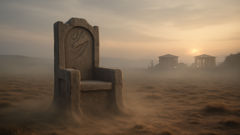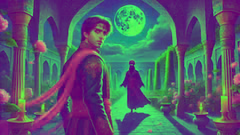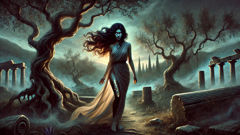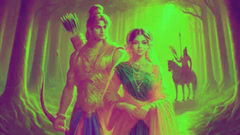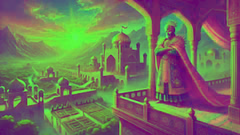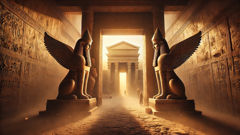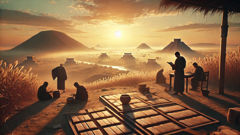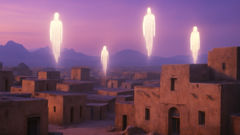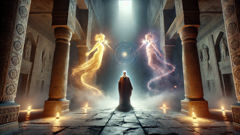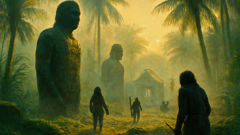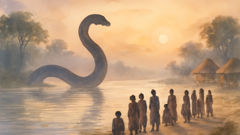Introduction
From the windswept uplands of Anatolia and the shadowed halls where cedar beams drink smoke, a story moves with the persistence of a rumor and the inevitability of a carved stone. It speaks of Kumarbi, the oldest of the gods, who gnawed at his own fate and found that hunger can be a kind of prayer and a warning at once. The myth makes a map from the moment he tastes victory to the moment he tastes the bitter iron of defeat, a map that will fracture the heavens and redraw the earth. In this world, kings are not crowned only by the bronze of their swords but by the cunning whispered in the ears of priests, scribes, and soldiers who fear the cost of rule more than the violence that births it. The gods quarrel in the cedar-and-styx corridor of the divine palace, where thunder is a rhetoric and oaths are heavy with the weight of eternity. The tale refuses to stay on the page; it spills into the minds of farmers who count seeds before a harvest, into merchants who barter futures on credit with the gods themselves, and into temple walls that sweat with the heat of ceremony. It is a memory of a country that learned to spell power with names that bite and to bind fate with ritual and blood. When you walk the dusty tracks of old Hatti, you walk through a country that was always being born, over and over, as if to prove that even the oldest gods must die to keep dictating the terms of a world for which their throne was never a guaranteed right. And so the Kumarbi cycle begins not with a prince but with a gnawed seed of kingship, with a father’s scream becoming a law, with a realm that must learn to listen to its own violence and call it history.
Rising Thunder: Kumarbi’s Ascension
The first breath of the Kumarbi cycle smells of rain on stone and the iron of ancient obligation. Kumarbi, old god of the earth and tempest, devours the old order to make space for a new one, but in devouring the father he also eats the future, and the future clenches back with a teeth of cunning. The text of the myth does not spare the reader the violence that births the cosmos: a fatherly throne is claimed not by fealty but by deceit, and the oaths sworn to hold the heavens in their rightful places are broken in secret, under the eyelids of watchful stars. In the cedar hall, the father Anu basks in the knowledge that power has a scent—bronze, resin, and the cold of a god who has learned that kingship is a covenant with danger. Kumarbi, however, is not content to wait for destiny to ring the doorbell; he gnaws, he schemes, he travels into the underground caves of memory and returns with a plan that will fracture the glaze of heaven. The cycle’s beginning is not a victory march but a confession that every throne rests on a precipice, that the most certain rules are made of shifting sand and the thunder of those who dare to seize it. What follows will be a chain of births, oaths, betrayals, and revelations—each one a single key that could unlock a door to either paradise or ruin. The narrative moves through riven mountains, through temples locked to protect their most feverish secrets, and through the mouths of kings who speak in wagers and in the slow, dangerous language of ritual. It is a story of ascent and appetite, of a god who will not merely take a throne but reforge reality to fit a new order, even as his teeth leave marks on the teeth of the world.
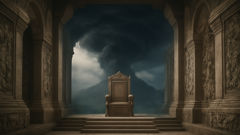
The Blood Moon Council: Betrayal and the Birth of a New Order
The council of gods gathers beneath a moon that bleeds light, and in that red-tinted hour, the old pact frays into splinters. The birth of a new order is not neat or merciful; it is a brutal schooling in anticipation and fear. Kumarbi’s kinship with harm deepens as he orchestrates a sequence of rivalries, each designed to unseat a rival by turning his own strengths against him. In this ancient theatre, a son’s secret weapon is not merely the will to rule but the capacity to endure the consequences of violence—the way a crown weighs down the brow, the way a city learns to fear the rain because it falls hardest on the throne. The myth’s power lies in its insistence that kingship is not a gift but a test to which every generation must submit, a renewal ceremony that costs blood and memory in equal measure. The gods plot, the priests chant, and the people watch as the ground itself seems to tremble with the echo of old taxes paid with blood and new oaths broken for survival. Out of betrayal— forged in a furnace of fear—arises a new order that is as fragile as it is fierce. The language of the gods becomes a tool for the ambitious: words sharpened to cut through lineage, to redefine what it means to be worth the crown. The story moves toward a reckoning that will ripple through cities, temples, and households for generations, teaching even mortal scribes that power is a language spoken in violence, read in blood, and remembered in stone. By the end, the cosmos itself bears witness to a king who did not inherit a throne so much as he forged one with every oath he kept and every oath he broke.
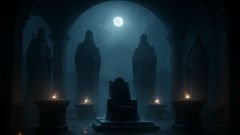
Conclusion
The Kumarbi cycle closes not with a neat logline but with the quiet arithmetic of memory. Generations later, people still speak in the cadence of its syllables—names that bite, oaths that burn, and a sense that power, once seized, imposes a burden as heavy as iron. The myth teaches that kingship is a dangerous gift, granted only to those who understand that every crown rests on a balance of violence and wisdom, fear and mercy. It is more than a story of fathers and sons; it is a map of ritual, language, and the stubborn, stubborn will of a people who survived by turning divine strife into cultural memory. The gods may have shaped the world, but humans learned to navigate the consequences, to carve laws from the storm, and to keep a fragile peace by remembering how easily kings fall when the price is forgotten. In that remembering lies the enduring power of this myth: that to tell it is to keep alive a country’s self-knowledge, even when the telling is hard, even when the truth is brutal, even when the throne remains a perilous dream.

